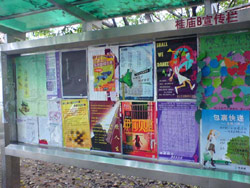| Home / Entertainment / Odd News | Tools: Save | Print | E-mail | Most Read |
| Ads for Fashion and Soda Pop Pollute Campuses |
| Adjust font size: |
Fashion Maker, a young advertising company owned and operated by a team of college undergraduates, has bought up ad space in the dining halls of 46 colleges and universities in Shanghai. Fashion Maker has also covered 40 colleges in other cities with advertisements and is approaching others for ad space, according to the Jiefang Daily on Tuesday. Indeed, these young people are admirable for their entrepreneurship. Their ambition, however, has been misdirected to halls of learning. Universities are not proper places for commercial ads. Defined by English statesman Benjamin Disraeli as "a place of light, of liberty and of learning," a university should be a home to liberal pursuits in humanities and sciences, a temple of the Muses. The Chinese term for university is Daxue. Da means "large or great," and xue means "learning." A Daxue per se is a place for studies on great, elevating and enlightening subjects. Commercial advertisements, on the contrary, do not fall into the category of great or enlightening subjects. Some may dismiss this as exaggeration. They may thus question the efficacy of wholesale bans. That's no more than a partial truth. There are, tragically, quite a few colleges and universities that are infatuated with opening themselves to waves of commercialism. Prestigious colleges and universities overseas, by contrast, have more confidence in their role as home to the mind in an age of money. For them, it is not necessary to boycott the presence of ads. Thanks to their time-honoured tradition, the presence of commercial advertising on their campuses is virtually impossible. "Elite universities in the US, such as Yale and Princeton, have most impressive campuses," said Professor Sun Xiangchen, vice-dean of the school of philosophy at Fudan university. "The spaces are tranquil and solemn, steeped in history and ideas of enduring value." Professor Sun was a visiting scholar from 2003 to 2004 at Yale University. He described with delight the neo-gothic Common Room of the Graduate School of Art and Science, the lunch times and coffee breaks there, when students, teachers and scholars shared their views and thoughts in refined conversations. "All these would be nullified, if you raise your eyes and see an ad for Coca Cola on the wall of the Common Room," he said. His words remind me of Irish poet W. B. Yeats, who wrote in his letters, "I wonder anybody does anything at Oxford but dream and remember, the place is so beautiful. One almost expects the people to sing instead of speaking. It's all ... like an opera." The beauty would be damaged, if this opera were interrupted by the jarring notes of commercial ads. "Education takes place not only in lecture rooms," Sun added. "But in daily campus life as well." Since every part of a university space is significant for education in daily life, the space of dining halls should not be seen as a somewhat "worldly" space on campus. Like libraries or lecture rooms, dining halls should not be commercialized at will. If students listened to lectures on literature, politics and the sciences in auditoriums - and then were beguiled through ads presenting cheap pleasures of mass consumption at their refectory tables - the "being" of universities would be turned into a "misbeing" of self-contradiction. When ads occupy dining halls, it would be very difficult to hold the line at libraries and lecture rooms. The self-contradiction would thus lead to the self-destruction of universities as places of undisturbed learning. (Shanghai Daily March 10, 2007) |
| Tools: Save | Print | E-mail | Most Read |
 |
| Related Stories |
